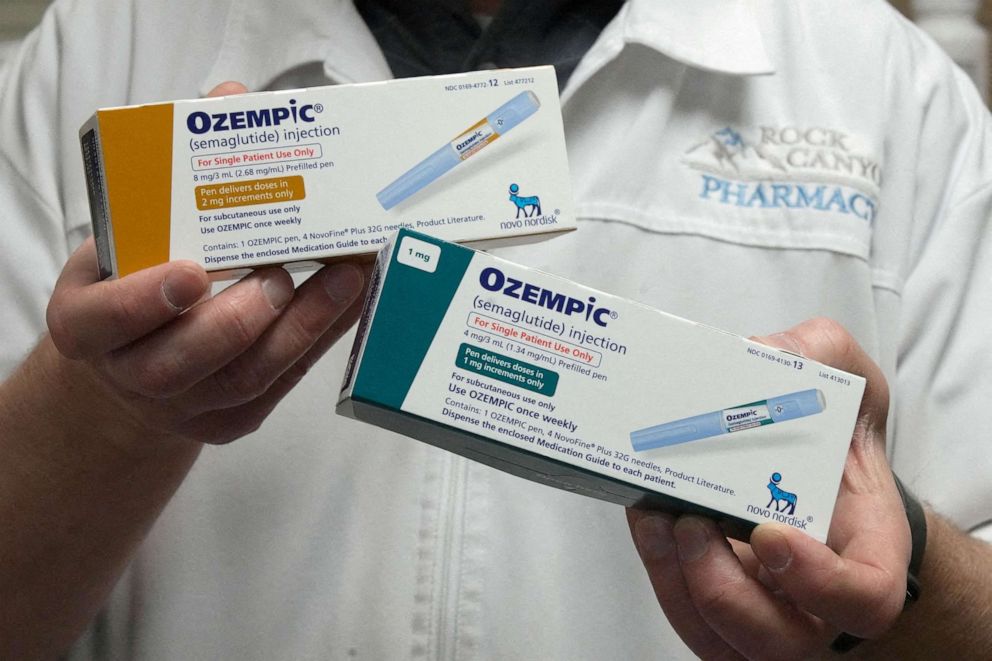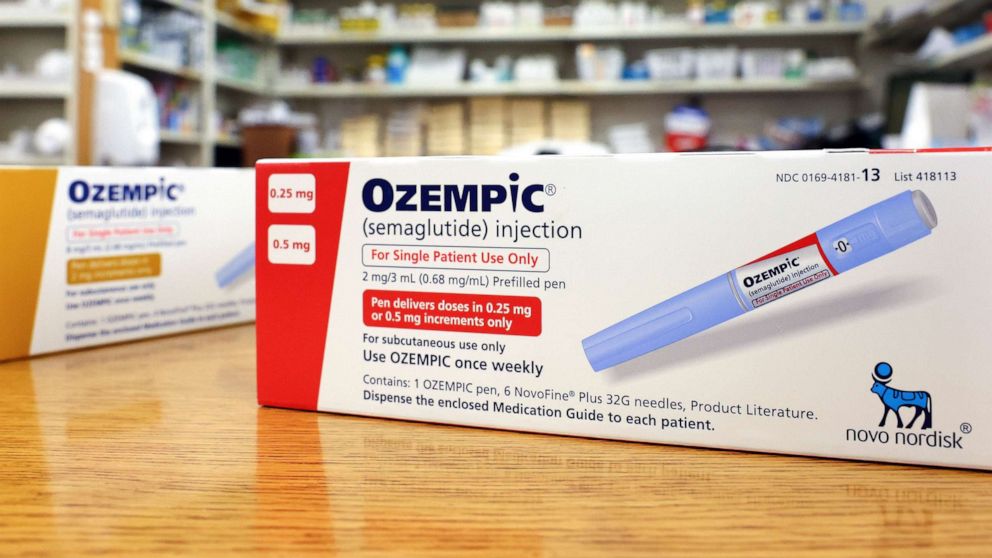Semaglutide (Ozempic, Wegovy) and other drugs in its class are widely known for their role in managing type 2 diabetes and suppressing appetite. They may also prove helpful one day in curbing certain addictive behaviors like alcohol use and smoking, according to research.
Preclinical research has shown promising results, and endocrinologists and patients have described, anecdotally, reduced cravings for alcohol, shopping, and even coffee.
“The consistency that I’m hearing from all across patient groups is gain of control, whereas previously, there was a loss of control,” Gitanjali Srivastava, MD, an internist and director of the obesity medicine program at Vanderbilt University Medical Center in Nashville, Tennessee, told MedPage Today. “All of a sudden, there is a calm. It’s like the calm after the storm.”
In addition to blunting previously uncontrolled eating, patients have described a feeling as if “a valve was turned off” on an array of other behaviors after starting the drug, Srivastava said. “All of a sudden they’re able to step back and say, ‘Oh, well, I had this shopping phenomenon that was going on, gambling, addiction, or alcoholism, and all of a sudden, it just stopped.'”
However, the precise mechanisms behind semaglutide and other GLP-1 agonists’ effects on behaviors like smoking and drinking are not well-understood. Researchers are in the early stages of studying the use of this class of drugs for addictive behaviors in humans, and experts have said unresolved questions about a potential addiction indication for semaglutide should elicit attention — and caution — from prescribers.
Semaglutide modulates the release of insulin via the pancreas, which is how it helps people with type 2 diabetes to control their blood glucose. But it also works in the brain via GLP-1.
“If we look at where the GLP-1 receptor is in the brain, it is really widely distributed. So, it is in many centers of the brain in nuclei that would be associated with these types of behaviors,” Daniel Drucker, MD, of the Lunenfeld-Tanenbaum Research Institute at Mount Sinai Hospital in Toronto, told MedPage Today.
“The challenge we have is, we have the anecdotal reports, which are pretty widespread. We have lots of clinicians reporting this and many people on social media reporting their experiences. What we don’t have are definitive randomized controlled clinical trials,” he added.

A pharmacist displays boxes of Ozempic, a semaglutide injection drug used for treating type 2 diabetes made by Novo Nordisk, at Rock Canyon Pharmacy in Provo, Utah, Mar. 29, 2023.
George Frey/Reuters
Over the years, animal studies have shown similar reactions to other GLP-1 agonists like liraglutide (Saxenda), which suppressed or reduced alcohol consumption in rats and African vervet monkeys. Studies about exenatide (Byetta) and opioid-related behaviors had mixed results, although it did decrease nicotine intake in mice.
While Drucker said the mechanisms behind an effect like this “are not very well-delineated,” one may have to do with dopamine availability. “GLP-1 will suppress either the amount of dopamine or dopamine transporters, implying, indirectly … that somehow we’re not getting as much pleasure or not getting as much reward because dopamine is induced by many of these substances that we take, which is part of the pleasure in taking them.”
Another may have to do with the neurotransmitter GABA. Lorenzo Leggio, MD, Ph.D., of the National Institute on Alcohol Abuse and Alcoholism, co-authored a recent study that found that semaglutide reduced “binge-like” alcohol drinking and alcohol dependence in mice and rats, respectively. This was true in both males and females and the rodents also showed an aversion to a sweetened solution.
Leggio said that medications used for alcohol use disorder, like acamprosate (Campral), act on GABA.
In the study, “we showed that the semaglutide is hitting some of the key factors related to addiction in our brain, such as dopamine and GABA,” Leggio told MedPage Today. “So it’s another piece of the pie, another proof of evidence that the semaglutide is working on those systems in the brain that we know are important for addiction.”
Leggio is now working on a protocol for a randomized controlled trial that will look at semaglutide and alcohol use in humans and collaborating with Oklahoma State University on a similar study.
There is still a measure of disagreement over exactly how GLP-1 signals are sent in the gut and brain, he said. What he and others are studying is how GLP-1 produced in the brain and GLP-1 produced in the gut interact, which could inform whether the effects of semaglutide in reducing alcohol drinking are related to the effects of semaglutide in the body.
But physicians like Srivastava and Jody Dushay, MD, an endocrinologist at Beth Israel Deaconess Medical Center in Boston, have noticed real-world signs.
Dushay told MedPage Today a small number of her patients who take GLP-1 agonists have reduced cravings or use of alcohol. “Anecdotally, it is true,” she said. However, “I have only heard from people when they mentioned it spontaneously, so it’s really a small number of people who mentioned alcohol.”
Few of Dushay’s patients smoke, she added, and she hadn’t heard from patients about other behaviors like shopping or phone use.
Dushay also wondered whether a common side effect from semaglutide could also play a role in alcohol aversion: nausea, which she estimated around 85% of her patients experience to some degree.
“Some people might say, ‘I have no nausea and I really have not wanted to drink,'” she said. “And other people say, ‘I’m so nauseous, I don’t even want to have a drink.’ So, it could be either or. Or it could be both.”
However, nausea is usually short-lived as patients develop a tolerance to semaglutide. It’s also possible, Dushay and others said, that an overall blunting of pleasure responses could be behind the phenomenon.
“It’s not entirely surprising that some people might feel like they’re not getting pleasure out of activities that they were getting pleasure out of before,” she noted. “It may just be the case that … it’s just not scratching the itch anymore.”
Experts also warned of the potential risk of serious mental health issues that could arise from what is known as anhedonia, the reduced ability to experience pleasure. Labeling for Wegovy contains a warning about suicidal ideations and advises avoiding its prescription to patients with a history of suicidal thoughts.
“This is exactly why we have to do double-blind placebo-controlled studies, to look not only at the efficacy, as we hope, but also safety, in particular, because people with alcohol use disorder and addiction in general often have a comorbidity with other mental health problems, including depression,” Leggio said, stressing the importance of monitoring closely for depressive symptoms.
But, he added, “We are definitely … not concerned based on what we know so far because semaglutide has been prescribed worldwide and there have not been red flags.”
Another big unknown, Drucker noted, is the dose-response relationship needed to produce the suppression of addictive behaviors, compared with weight loss and diabetes control.
“Are they identical? In which case, I don’t really want to have everybody losing weight if they’re trying to necessarily quit smoking or reduce their dependency, or can we get away with doses that are lower than those required to achieve weight loss?” Drucker said. “That’s a really interesting question. And we just don’t have good data to answer it.”
Ultimately, experts agreed, all patients are different, and there’s still no way to predict how someone will respond to semaglutide and other GLP-1 agonists.
“It’s good to be aware, as someone who prescribes them often, that you need to ask patients about all this and not just be looking at ‘how many pounds have you lost?'” Dushay said. “Really [ask], ‘what is this medication doing in your body?’ and start to ask a wider range of questions, rather than just putting someone on the scale and titrating up a dose.”
“Do you think that the semaglutide is going to dramatically save the world from addiction? The answer is no,” said Leggio. “If you asked me, ‘Do you think that semaglutide is a promising medication to help people with alcohol use disorder?’ I think the answer is yes.”

